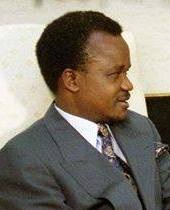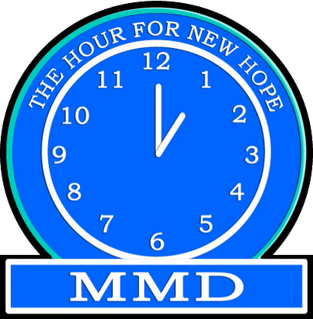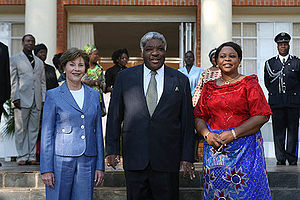
The politics of Zambia takes place in a framework of a presidential representative democratic republic, whereby the president of Zambia is head of state, head of government and leader of a multi-party system. Executive power is exercised by the government, while legislative power is vested in both the government and parliament. Formerly Northern Rhodesia, Zambia became a republic immediately upon attaining independence in October 1964.

Frederick Jacob Titus Chiluba was a Zambian politician who was the second president of Zambia from 1991 to 2002. Chiluba, a trade union leader, won the country's multi-party presidential election in 1991 as the candidate of the Movement for Multi-party Democracy (MMD), defeating long-time President Kenneth Kaunda. He was re-elected in 1996. As he was unable to run for a third term in 2001, former Vice President Levy Mwanawasa instead ran as the MMD candidate and succeeded him. After leaving office, Chiluba was the subject of a long investigation and trial regarding alleged corruption; he was eventually acquitted in 2009.

The Movement for Multi-party Democracy (MMD) also known as New Hope MMD is a political party in Zambia. Originally formed to oust the previous government, MMD controlled an absolute majority in parliament between 1991 and 2001, when its past leader, Frederick Chiluba was President of Zambia. Its election into power in 1991 ended the 27-year rule of President Kenneth Kaunda and his United National Independence Party (UNIP). It remained the dominant party within Zambian politics until the general elections of September 2011.

The President of the Republic of Zambia is the head of state and head of government of Zambia and is the highest executive authority in the country. The President is elected by popular vote for a five-year term and is responsible for the administration of the government, overseeing the implementation of national policies, and representing Zambia in international affairs. The office was established at Zambia's independence in 1964. The current President is Hakainde Hichilema, who assumed office on August 24, 2021, following the 2021 presidential election where his party, the United Party for National Development, won a majority. The President's role includes appointing the Cabinet, serving as Commander-in-Chief of the Zambian Defence Force, and ensuring the enforcement of laws.

The Patriotic Front (PF) is a political party in Zambia, founded in 2001 by Michael Sata. It emerged as a breakaway party from the Movement for Multiparty Democracy (MMD) after Sata was not selected as the MMD's presidential candidate for the 2001 elections. The PF is primarily supported by the youth and the urban poor, and it gained significant political influence over time.

Michael Charles Chilufya Sata was a Zambian politician who served as the fifth president of Zambia from 2011 until his death in 2014. A social democrat, he led the Patriotic Front (PF), a major political party in Zambia. Under President Frederick Chiluba, Sata was a minister during the 1990s as part of the Movement for Multiparty Democracy (MMD) government. He went into opposition in 2001, forming the PF. As an opposition leader, Sata – popularly known as "The King Cobra", emerged as the leading opposition presidential contender and rival to President Levy Mwanawasa in the 2006 presidential election, but was defeated. Following Mwanawasa's death, Sata ran again in 2008, losing to Rupiah Banda.

Rupiah Bwezani Banda was a Zambian politician who served as the fourth president of Zambia from 2008 to 2011, taking over from Levy Mwanawasa. Banda was an active participant in politics from early in the presidency of Kenneth Kaunda, during which time he held several diplomatic posts.

Tendai Laxton Biti is a Zimbabwean politician who served as Finance Minister of Zimbabwe from 2009 to 2013. He is the second Vice President of Citizens Coalition for Change. He was the Secretary-General of the Movement for Democratic Change and the subsequent Movement for Democratic Change – Tsvangirai (MDC-T) political parties and a Member of Parliament for Harare East until he was expelled from the party and recalled from parliament in mid-2014,before winning the seat again in 2018.

A political crisis began in Zimbabwe on 11 March 2007 when opposition leader Morgan Tsvangirai was beaten and tortured after being arrested, prompting widespread domestic and international criticism.
Sydney Tigere Sekeramayi is a Zimbabwean politician who served in the government of Zimbabwe as Minister of Defence between 2013 and 2017. He has been a minister in the Cabinet since independence in 1980, serving as Minister of Defence from 2001 to 2009 and Minister of State Security from 2009 to 2013.
An Yue Jiang is a People's Republic of China container vessel operated by the state-run shipping firm COSCO. In 2008, it became notable because of controversy surrounding a cargo of arms and ammunition destined for Zimbabwe. The cargo reportedly includes some 3 million rounds of small arms ammunition, 1,500 rocket propelled grenades, and 2,500 mortar rounds. The vessel originally planned to dock at the South African port of Durban and unload its cargo for shipment to landlocked Zimbabwe. However, there were widespread protests by persons concerned that the arms would be used by Robert Mugabe's regime in suppressing political opposition in the wake of disputed elections. Dock workers stated that they would not unload the cargo, and others threatened to stop the shipment on South African roads. Finally, a South African judge ruled that the ship could not dock as planned.
Campaigning for the first round of the presidential election held in Zimbabwe on 29 March 2008 took place from February to March. There were three major candidates: President Robert Mugabe of the ruling Zimbabwe African National Union - Patriotic Front (ZANU-PF), Morgan Tsvangirai of the opposition Movement for Democratic Change, and the independent candidate Simba Makoni.
This article gives details about the vote counting system for the 2008 Zimbabwe presidential election
Zambian President Levy Mwanawasa called an emergency meeting of SADC leaders for 12 April during the 2008 Zimbabwe presidential election to discuss the post-election impasse. According to Mwanawasa, Zimbabwe's "deepening problems" meant that the issue needed to be "dealt with at presidential level". Jacob Zuma, meanwhile, said that he thought results should have already been announced, and he described the failure to release them as "unprecedented".
The events of the first and second rounds of the Zimbabwean presidential election, which Robert Mugabe of ZANU-PF won on 27 June 2008 after his challenger, Morgan Tsvangirai of the Movement for Democratic Change (MDC), withdrew from the process and declared it illegitimate, caused reactions from many international bodies. Other Zimbabwean groups have denounced the poll as well
The second round of voting in the Zimbabwean presidential election of 2008 was held between Robert Mugabe and Morgan Tsvangirai after the first round failed to produce a 50% majority for either candidate. The election process was marred by violence against and intimidation of voters and party workers, which eventually led to the withdrawal of Tsvangirai from the poll. This left Mugabe as the winner of, effectively, a one-candidate election.

The 2008–2009 Zimbabwean political negotiations between the opposition Movement for Democratic Change, its small splinter group, the Movement for Democratic Change – Mutambara, and the ruling Zimbabwe African National Union – Patriotic Front were intended to negotiate an end to the partisan violence and human rights violations in Zimbabwe and create a framework for a power-sharing executive government between the two parties. These negotiations followed the 2008 presidential election, in which Mugabe was controversially re-elected, as well as the 2008 parliamentary election, in which the MDC won a majority in the House of Assembly.

Presidential elections were held in Zambia on 30 October 2008 following the death of the incumbent President Levy Mwanawasa on 19 August 2008, as the elections had to be called within 90 days of his death. It was expected that there would be internal problems within the ruling Movement for Multi-Party Democracy (MMD) as Mwanawasa had not declared a successor prior to his death, but Acting President Rupiah Banda was selected as the MMD's candidate without apparent problems. Michael Sata stood as the candidate of the Patriotic Front (PF), while Hakainde Hichilema stood as the candidate of the United Party for National Development (UPND). Godfrey Miyanda stood as the candidate of the Heritage Party.

Morgan Richard Tsvangirai was a Zimbabwean politician who was Prime Minister of Zimbabwe from 2009 to 2013. He was president of the Movement for Democratic Change, and later the Movement for Democratic Change – Tsvangirai (MDC–T), and a key figure in the opposition to former president Robert Mugabe.

General elections were held in Zimbabwe on 29 March 2008 to elect the President and Parliament. Because of Zimbabwe's dire economic situation, the elections were expected to provide incumbent President Robert Mugabe with his toughest electoral challenge to date. Mugabe's opponents were critical of the handling of the electoral process, and the government was accused of planning to rig the election. Human Rights Watch said that the election was likely to be "deeply flawed." The elections were characterized by violence.
















